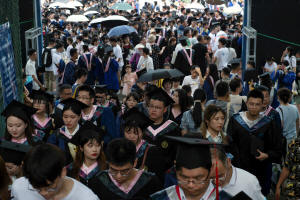Chinese professor says youth jobless rate might have hit 46.5%
 Send a link to a friend
Send a link to a friend
 [July 20, 2023] By
Ryan Woo and Ellen Zhang [July 20, 2023] By
Ryan Woo and Ellen Zhang
BEIJING (Reuters) -An unusually public claim by a Chinese professor the
country's youth jobless rate might have hit close to 50% in March has
stoked a debate about official data and a soft labour market, despite
curbs on negative portrayals of the economy.
The National Bureau of Statistics said that month's jobless rate for
people between the ages of 16 and 24 was 19.7%, less than half of what
Peking University professor Zhang Dandan estimated.
If 16 million non-students "lying flat" at home or relying on their
parents were included, the rate at that time could have been as high as
46.5%, Zhang wrote in an online article in respected financial magazine
Caixin.
The article by Zhang, associate professor of Economics at the
university's National School of Development, was published on Monday but
has since been removed.
The official youth jobless rate, which only includes people actively
seeking work, rose further to a record 21.3% in June after the world's
second-biggest economy lost steam in the second quarter.
Policymakers have struggled to put the economy on a more stable footing
since the COVID-19 pandemic.

Zhang's research focused in part on the impact of the outbreak on the
manufacturing hubs of Suzhou and Kunshan in eastern China.
"Employment there only recovered to two-thirds of pre-COVID levels till
March, when COVID faded," she wrote. "Young people remain major workers
in the manufacturing sector, so they were hit more badly."
Additionally, regulations introduced since 2021 in the tutoring,
property and online platform sectors have disproportionately hit young
employees and the well-educated, she said.
Calls by Reuters to Zhang's work phone went unanswered and the
statistics bureau did not immediately respond to a request for comment.
[to top of second column] |

Graduates, including students who could
not attend last year due to the coronavirus disease (COVID-19)
pandemic, attend a graduation ceremony at Central China Normal
University in Wuhan, Hubei province, China June 13, 2021. Picture
taken June 13, 2021. REUTERS/Stringer/File Photo

SOCIAL MEDIA CLAMPDOWN
One user on China's popular Twitter-like microblog Weibo criticised
Zhang's article on Thursday, saying her statistical methodology was
flawed, as economists generally do not count people who are not
actively seeking work when compiling estimates for joblessness.
But other social media users focused on how hard it still is to find
a job in China.
"The reason why so many graduate students flock to sit postgraduate
or civil servant exams instead of looking for jobs is because they
just cannot find jobs," one Weibo user said in a post.
But according to an editorial from state-run Xinhua on Wednesday,
the economy had a strong start in the first quarter and the momentum
continued in the second.
It dismissed talk China was entering a "balance sheet recession",
where consumers and businesses put money towards paying debt instead
of spending or investing.
Over the weekend, China's internet regulator closed social media
accounts that posted "essays" on policymaking that were really "rumours".
It also clamped down on social media videos that depicted poverty,
saying some of them were staged.
A graduate from an Australian university told Reuters she had
applied for over 30 jobs in China.
"I've been looking for jobs for a long time and the trend doesn't
look good," she said, speaking on condition of anonymity.
"I'm exhausted."
(Reporting by Ryan Woo and Ellen Zhang; Additional reporting by
Beijing newsroom; editing by John Stonestreet)
[© 2023 Thomson Reuters. All rights
reserved.]
This material may not be published,
broadcast, rewritten or redistributed.
Thompson Reuters is solely responsible for this content. |